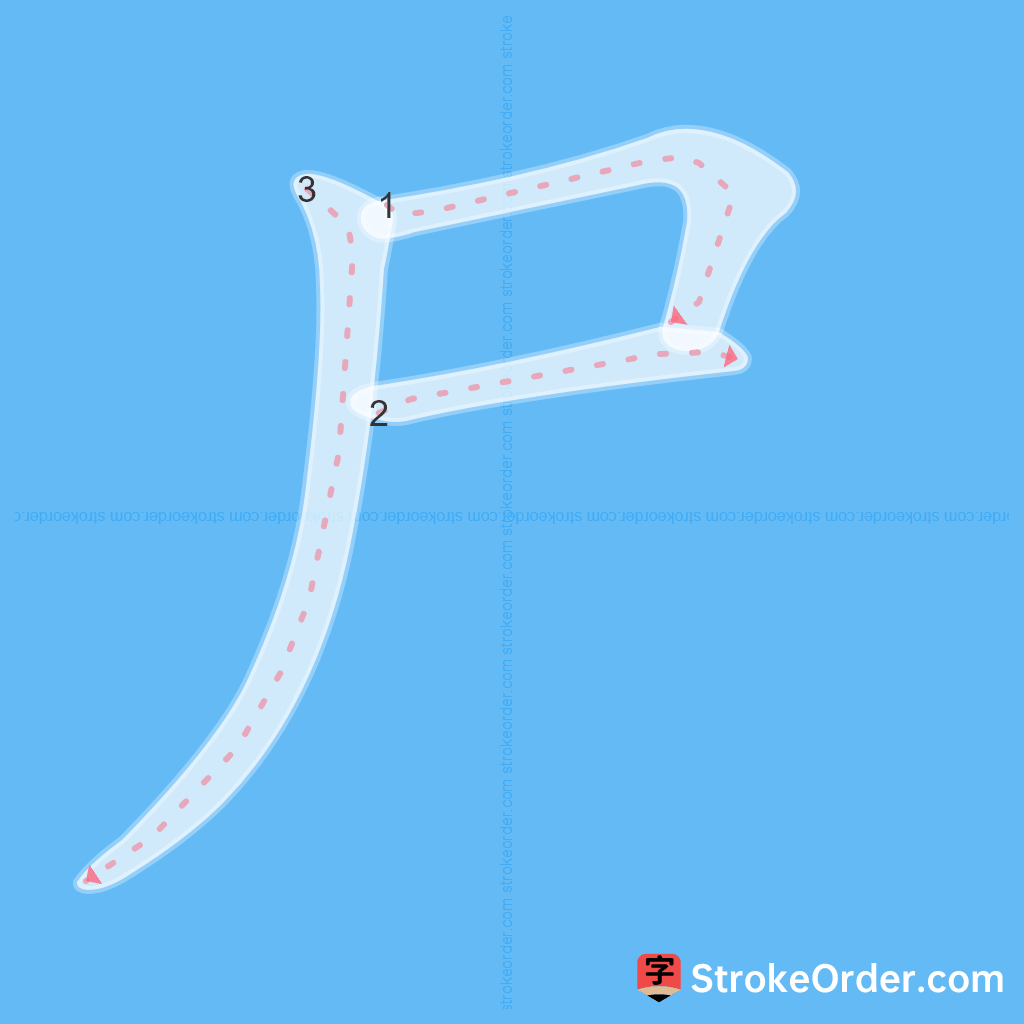尸 Stroke Order
Animated Stroke Order of 尸

Stroke Order Diagrams for 尸

Step-by-Step Handwriting Guide for 尸

Learn to Write Chinese Characters with Video Tutorials
Watch the video of writing the Chinese character "尸", learn the correct stroke order (笔顺) of the character "尸", and master the standard way of writing the character "尸".
Free Printable Handwriting Practice with Stroke Order: 尸
Printable Writing Practice Worksheet of "尸" in Portrait Orientation (Tian Zi Ge)

Printable Writing Practice Worksheet of "尸" in Landscape Orientation (Tian Zi Ge)

Information of 尸
Pinyin
shī
Radical
尸
Strokes
3 strokes
Usage
★★★★★
Definition
corpse
尸 (shī)
名词 (noun)
1. 死人的身体: corpse; body of the deceased.
2. 〔~位〕空占着职位而不做事,如“~~素餐,” “~~误国”: to hold a position without fulfilling its duties; inertia in office.
3. 古代祭祀时,代表死者受祭的人: a person representing the dead during ancient rituals.
同本义: person on behalf of the dead.
引例:
1. 《说文》:尸,神像也。象卧之形。: "Shī, means 'spirit image'; it resembles a lying figure."
2. 《诗·小雅·楚茨》:神具醉止,皇尸载起。鼓钟送尸,神保聿归。: "The divine vessel drunk is stilled, the emperor's corpse is carried. Drums and bells send forth the corpse, may the deity protect the return."
3. 《仪礼·士虞礼》: "When blessings reach the corpse."
4. 《礼记·曲礼》: "Sons may serve as 'corpse' for their fathers."
动词 (verb)
1. 陈尸示众,陈列: to display a corpse publicly.
2. 立神像或神主: to erect a spirit tablet.
3. 担任;承担: to bear or assume (responsibility).
4. 执掌,主持: to hold or preside over (ceremonies).
5. 在其位而无所作为: to be in an inert position; to hold a position without action.
6. 列阵: to arrange formation (in battle).
引例:
1. 《诗·召南·采蘋》: "Who presides over it?"
2. 《左传·庄公四年》: "The King of Chu executed the corpse."
尸 (shī)
名词 (noun)
1. 尸体: corpse.
引例:
1. 《说文》:屍,终主也。从尸,从死: "The character for corpse combines 'body' and 'death'."
2. 《礼记·曲礼》: "On the bed, it is called the corpse."
3. 《聊斋志异·促织》: "And then his body was found in the well."
例子:
- 验尸 (to verify a corpse)
- 五马分尸 (to dismember a corpse)
- 借尸还魂 (to borrow a corpse to bring back a soul)
- 尸车 (vehicle for transporting a corpse).
lit. reincarnated in sb else's body (idiom); fig. a discarded or discredited idea returns in another guise
Input Method for 尸
Pinyin
shi1
Wubi
nngt
Cangjie
s
Zhengma
xm
Four Corner
77207
Unicode
U+5c38
Same Pronunciation Characters